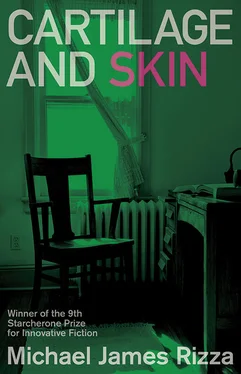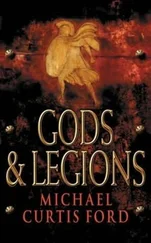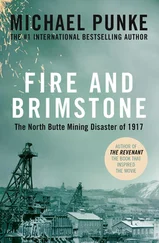“You know, I was waiting for you,” she said. “I told myself that I would give you twenty minutes.” She brought two glasses to the counter; one was partly full.
“Pinot grigio.” She showed me the bottle. “I love pinot grigio. Santa Margherita is the best.”
As she filled both of the glasses to the rim, I took a seat.
“You put the idea in my head. You had that slip of paper in your pocket with that name on it. That sounds good, I said, so I had my niece watch the store while I went out and bought myself a bottle.” She handed me the glass and continued talking. “Oh, I’m sorry. I emptied your pockets. I don’t know why; I was afraid something might get ruined.”
“That’s okay,” I said.
She set the bottle of white wine beside my elbow on the counter and walked back around. With the hood of the sweatshirt gathered behind her head, I couldn’t tell the length of her blonde hair.
“You know, I gave you twenty minutes, but then I was sitting here, drinking a glass or two of wine, listening to the music, and reading that book you had. I don’t really read books. I had no idea that people write like that. That’s good writing, right? When people say a book is great, that’s what they mean, right?”
She took the novel of out her purse, which was on the floor by the doorway, brought it over to me, and then picked up her glass of wine.
“I was going to take it home,” she said.
“Keep it.”
“Really?”
“Sure,” I said. “That’s the best writing can get. That’s what they mean by great writing.”
She smiled as if I’d just complimented her.
“I like that part about kissing his mother. What a poor kid. He fell into that ditch with the rat in it.”
“I remember.”
“I knew you were smart when I first saw you, a person who reads hard books. You’ve got that kind of distant look, like you’re watching everything.” She was standing in front of the counter, scanning the back cover of the book as she spoke. Her voice lowered a little, becoming almost apologetic. “Not now, though. Now, you look like somebody passed away or something.”
“No,” I said. “Nothing as sad as that.”
“Well, that’s good.” She continued to inspect the book, turning it over in her hands, as if she’d never seen it before. After a moment, she set the book on the counter. When she took a sip of wine, she peeped at me over the rim of the glass.
“Don’t make much of me; that’s just the way I am,” she said.
“Sure,” I responded, although I didn’t know what she meant.
“The wine is good though.”
“Yes,” I said and tasted the wine for the first time.
She pointed to the cart behind the counter and said, “I would have offered you coffee, if I was drinking coffee.”
“I like the wine.”
“Me too,” she said, with a complicitous, little smile. “Margherita knows what she’s doing. Strange thing that you had that name in your pocket.”
I discerned in her tone that she was fishing around for explanations, perhaps not so much about the name in my pocket but about why I had looked upset. Although she seemed to be somewhat quirky, a little too friendly, the woman exuded such a sense of comfort and simplicity that I almost felt obliged to talk. Of course, I was still cautious enough not to become too beguiled by her voice, her smile, and her eyes. I wasn’t going to reveal to her that officious men, at that very moment, were rifling through my belongings, looking for evidence of a moral cripple, nor was I going to explain that a pervert was circling around me, closing in, waiting for the opportunity to dive in upon his prey.
“Do you know who Margaretta is?” I asked.
“No.”
“She’s Martin Luther’s mom.”
“Really?”
Although the woman didn’t seem to know who I was talking about, I continued my babble, perhaps out of nervousness. “She used to believe that gnomes and elves lived in the woods outside her house, and they would steal eggs from her.”
“Really?” The woman put her hand on her stomach.
“Chicken eggs,” I clarified.
“Well, she may have been a nut, but she makes good wine.” She raised her glass to her lips but then set it on the counter without taking a drink as something else apparently caught her attention.
“Do you know what?” she asked. “Speaking of elves and gnomes.”
She moved behind me and walked around to the other side of the display case. When she reached up toward a shelf that contained the tubes and other contraptions, I was able to see a slight sliver of pale flesh just beneath her naval. She took down a shiny brown figure that appeared to be made of polished glass.
“This is the wizard,” she said, placing the thing before me. It was a sculpture of a long-bearded man; he was standing beside a tree that had several limbs cut off. A hole was in one of the stumps, and the trunk, which went straight up along the wizard’s back and reached higher than the fold of his drooping hat, also had a hole at the top.
“People use this to smoke?” I asked.
“Only serious people.” She smiled. “Or maybe people with friends. He’s been on the shelf for a while. I sell a lot more bats.”
“Bats?”
I partly imagined that she was going to pull down some leathery winged creature to accompany the wizard on the counter.
However, she pointed through the top of the glass case to a row of little metal cigarettes displayed on a green felt mat.
“A bat,” she said. “A one-hitter. A dug-out.”
“Those are bats?” I asked.
She smiled at me, as if I were a young, unworldly boy. “They don’t write about stuff like that in your books?”
“None that I’ve read.”
“Everyone buys them, which is kind of sad. If you’re going to smoke, I think you should do it with a group, you know. These are made for people to smoke by themselves.”
“And that’s sad?”
“Yeah. Smoking is supposed to bring people together. But these here.” She tapped on the glass. “They remind me that people are lonely and they want to get high alone. Isn’t that sad?”
“I suppose. Why do you sell them then?”
She shrugged, looking at me, smiling slightly.
“Don’t mind me; that’s just the way I am,” she said for a second time, and I still had no idea what she meant by this expression. I suspected that it was simply meaningless padding to her conversation.
“You look better,” she said. “More calm.”
“I’m fine.”
“A glass of wine is good for the nerves. I hope it wasn’t serious, whatever was bothering you before.”
“Nothing really.” I looked away from her, down the length of the glass counter. “I like the smell in here; it makes the place feel warmer.”
I knew she was still looking at me.
“You don’t have to tell me,” she said after a moment.
“It’s nothing,” I said. “I just lost my home, that’s all. I have to move.”
“Not out of the city, right?”
“I don’t know. At least, out of my apartment.”
“You have no place to stay?”
“I’m not officially out. All my things are there, but I can’t really go back anymore.”
“I’m sorry,” she said, her voice filled with sympathy. She leaned nearer and patted the back of my hand. “I understand.”
Her fingertips left a trace of warmth upon my skin.
“It’s a rough situation,” she said. “When I divorced my ex-, it was hard. I didn’t realize how much I’d grown with him until afterwards, but then, you know, I knew I made the right decision. Deep down, it didn’t feel right staying with him.”
Her gaze settled on my eyes, reading me. My countenance must have been so pathetic that it evidently confirmed for her whatever suspicions she had about me, and to some extent, she had guessed correctly: I was a man with a broken heart.
Читать дальше












